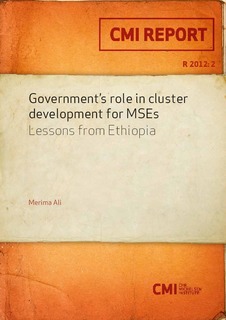| dc.contributor.author | Ali, Merima | |
| dc.date.accessioned | 2018-01-04T08:17:36Z | |
| dc.date.available | 2018-01-04T08:17:36Z | |
| dc.date.issued | 2012-09-19 | |
| dc.identifier | oai:www.cmi.no:4538 | |
| dc.identifier.citation | Bergen: Chr. Michelsen Institute (CMI Report R 2012:2) 24 p. | |
| dc.identifier.isbn | 978-82-8062-438-3 | |
| dc.identifier.issn | 0805-505X | |
| dc.identifier.uri | http://hdl.handle.net/11250/2474775 | |
| dc.description.abstract | Cluster development programs have become increasingly widespread tools in fostering innovation and growth of a competitive private sector in developing countries, including Ethiopia. As part of the MSE Development Strategy of the Government of Ethiopia, industrial clusters are considered as the main tool for spurring income and employment growth among micro- and small-scale enterprises. The purpose of this study is to analyze government’s interventions in cluster development in Ethiopia and discuss some of the concerning issues regarding these interventions. The study summarizes experience of cluster development policies in the past, analyzes the challenges and provides possible areas of government action to strengthen clusters. | |
| dc.language.iso | eng | |
| dc.publisher | Chr. Michelsen Institute | |
| dc.relation | CMI Report | |
| dc.relation | R 2012:2 | |
| dc.relation.ispartof | CMI Report | |
| dc.relation.ispartofseries | CMI Report R 2012:2 | |
| dc.relation.uri | https://www.cmi.no/publications/4538-governments-role-in-cluster-development-for-mses | |
| dc.subject | Micro- and Small-Scale Enterprises | |
| dc.subject | Industrial Clusters | |
| dc.subject | Cluster Development Policies | |
| dc.subject | Ethiopia | |
| dc.title | Government's role in cluster development for MSEs: Lessons from Ethiopia | |
| dc.type | Research report | |
